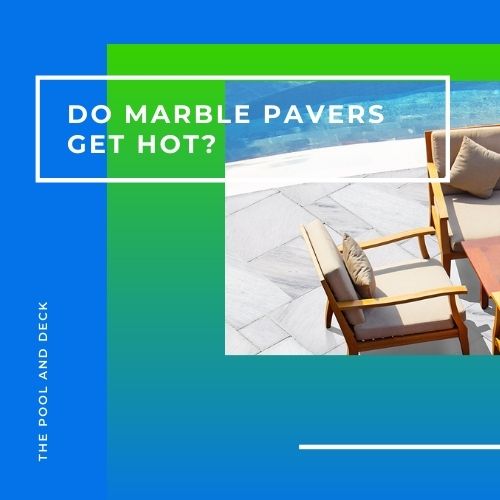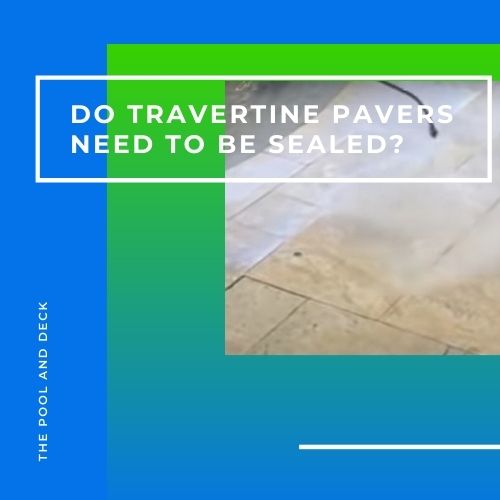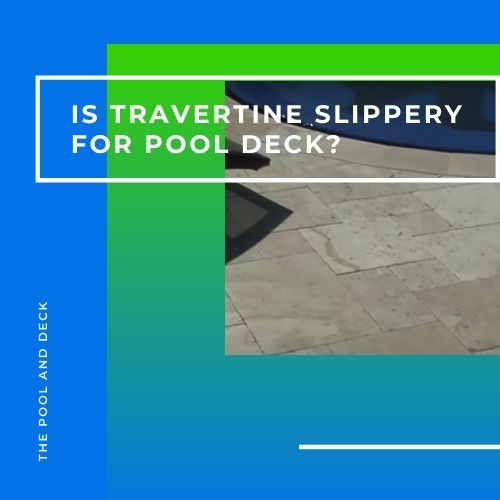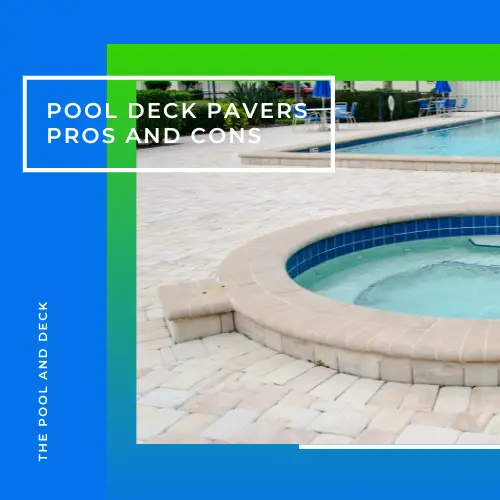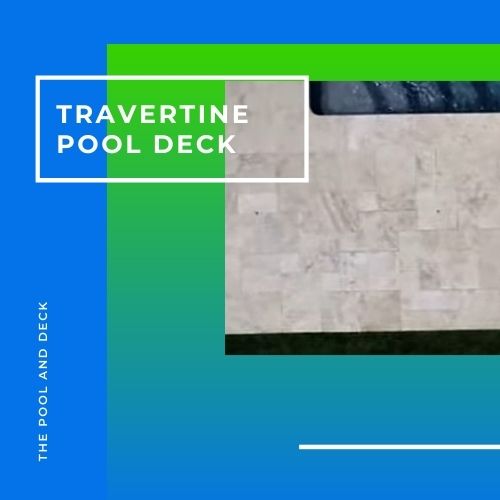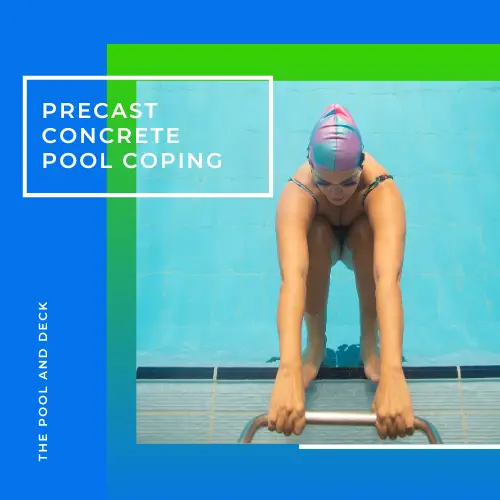Stamped Concrete Pool Deck: Is It Good Value for Money?
As an Amazon Associate, I earn from qualifying purchases.
Table of Contents
Is Stamped Concrete Good for a Pool Deck?
Your decision to build a pool in your backyard is a major financial decision. But it is a decision that will change your life, for the better. The pool deck is an essential part of a backyard pool. You may be wondering if stamped concrete is good for a pool deck?
A stamped concrete pool deck is hard wearing, durable and easy to maintain. You can get amazing looks at a really affordable cost per square foot. Stamped concrete does have a few disadvantages, but none that can not be overcome or fixed.
Pool decks have as much value as the pool itself. You may actually spend more time on the deck than in the pool! It’s the place to sunbathe, unwind with a drink at sunset or entertain friends on a starry night.
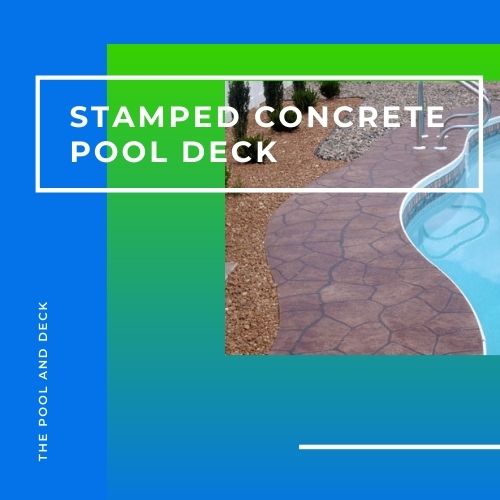
Naturally you want your pool deck to look beautiful, without breaking the bank!
Natural stone or hardwood pool decks are, of course, on the top of the “luxury pool deck” scale. But they will cost you an arm and a leg and then some! Pavers are cheaper but have a very functional rather than an elegant look.
Concrete pool decks are both economical and functional. Stamped concrete is at the more expensive end of concrete pool decks. But, a stamped concrete pool deck is still cheaper than a pool deck that uses pavers, hardwood or natural stone. And it looks amazing too!
What Are the Disadvantages of Stamped Concrete?
It is natural to have a few concerns about a stamped concrete pool deck. Even though stamped concrete is economical, a pool deck is a major investment. You do not want to get it wrong. You want to be proud to show off your pool deck!
So here are some concerns that you may have
Is Stamped Concrete Around Pool Slippery?
The reality is that any smooth surface that is wet is slippery. Polished natural stone such as granite or marble around a pool looks great but is slippery.
You would think that stamped concrete would be less slippery because it has a texture. This is not the case. The texture in stamped concrete is gradual, not gritty. Moreover stamped concrete must be sealed to get the desired look.
The sealer makes the stamped concrete around a pool slippery. Especially when it gets wet!
To make stamped concrete less slippery, you need to mix a non-slip additive such as H&C Sharkgrip Slip-resistant Additive into the topical sealer.
Does Stamped Concrete Fade?
The pattern is the key to the ultimate look of your stamped concrete pool deck. The color choice will be dictated by the pattern. In any case you need to have a base color and an accent color.
A skilled contractor will use the interplay between texture and color to deliver an elegant looking pool deck.
Stamped concrete pool decks look amazing when new. But what happens after a year or two? Will the colors fade and the surface become dull & lifeless?
To ensure that your stamped concrete pool deck can stand the test of time you need to
- Start by using good quality colors from reputed brands. Check out the Top Stamping Concrete Color Brands recommended by Concrete Network.
- Use top quality sealer and recoat every 2-3 years. I recommend using Foundation Armor AR350 Solvent Based Acrylic Wet Look Concrete Sealer.
Regular cleaning, maintenance and resealing is essential to maintaining the “new” look of stamped concrete for many years. A good quality sealer will ensure that stamped concrete will not get damaged even if it holds some water in the valleys of the texture.
Does Stamped Concrete Get Hot?
Yes. Stamped concrete gets hot. It gets hot, not because it is stamped. It gets hot because it is concrete. Brushed concrete or honed concrete would get hot as well.
Compared to concrete, some natural stones do not get as hot. Travertine and limestone are good examples.
Use of pavers, rather than concrete will also keep your pool deck cooler. Depending on the pattern, pavers can dissipate some of the heat to the surrounding earth & grass.
Then there is the Kool Deck. It is a lot cooler than a stamped concrete deck, even though it does not look so cool!
The bottom line is that a stamped concrete pool deck will get hot. When the mercury is hitting 85 degrees the deck may be at 105 degrees. You should not be walking barefoot on a stamped concrete pool deck on a hot summer day. Use water shoes!
Speedo, the trusted name in performance swimwear, have an excellent and stylist range of water shoes. Check them out:
For the Ladies: Speedo Women’s Water Shoe Surfwalker Pro 3.0
For the Gents: Speedo Men’s Water Shoe Surfwalker Pro 3.0
Is It Normal for Stamped Concrete to Crack?
Actually it is normal for concrete to crack. It is intrinsic to concrete. So, yes it is normal for stamped concrete to crack. Stamped concrete cracks, not because it is stamped, but because it is concrete!
However, stamped concrete is less likely to crack as compared to other types of concrete finishes. Moreover, the cracks will be less visible.
Concrete is strong but brittle. It can handle high compressive loads but cracks when subjected to tensile or flexural stress. Concrete slabs on grade crack due to:
- Shrinking during curing
- Ground movement
- Expansion & contraction
Find out more about why a stamped concrete pool deck cracks and how you can fix it on my earlier post Does Stamped Concrete Crack Easily? (What You Need To Know!).
How Much Does Stamped Concrete Around a Pool Cost?
There are a lot of variables involved when it comes to estimating the cost of a stamped concrete pool deck. Some obvious ones are location, area of the deck, thickness of the deck, complexity of the pattern etc.
As a very rough estimate you can expect to pay between $8 to $14 per square foot. This includes the cost of material and installation. The average residential pool deck in the US is 900 square foot. So expect to pay between $7,200 to $12,600.
In reality the costs could be higher as you may upgrade on some of the standard features. Please get quotations from at least 3 contractors.
More importantly get references and then visit the projects completed in the last 1 or 2 years. Talk to the homeowner, independent of the contractor to get an unbiased view.
Thank you very much for reading the post. I do hope you found it informative and helpful.


